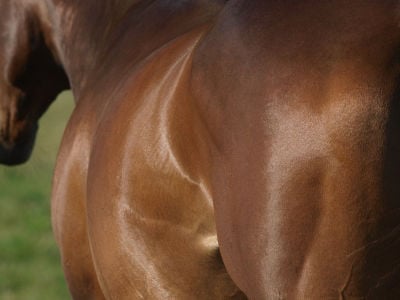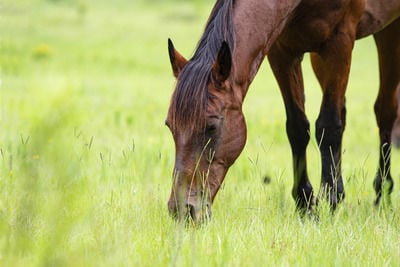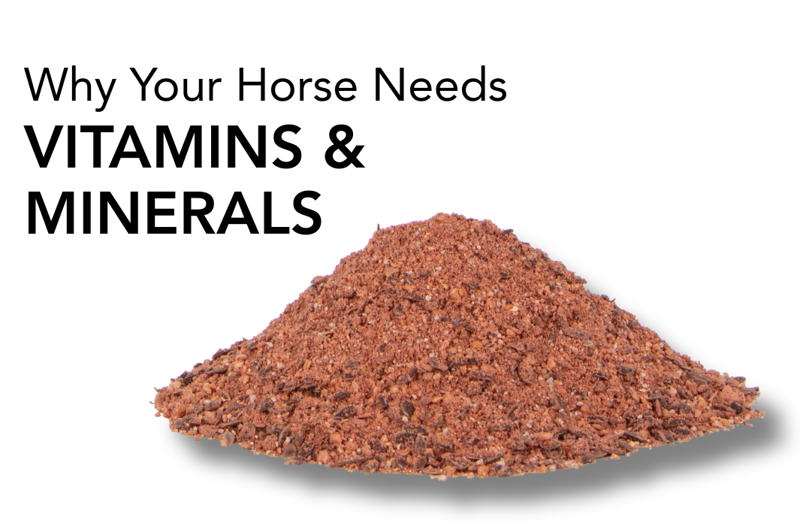In the summer months, a very common mistake is made by many horse owners who believe that horses turned out on good grazing do not need supplemental feed. In some cases this is partly true, as good summer grazing is high in calories and will therefore help horses to maintain or even gain weight over the summer. However, even the best grazing will not provide horses with a balanced source of vitamins and minerals no matter how much they eat.
If you have a good doer or a horse that doesn’t require a hard feed in the summer, a vitamin and mineral supplement is the best thing you can feed to ensure that a balanced diet is still being provided. Providing a balanced diet is important to the health and well being of the horse.
The importance of vitamins for your horse’s health
Vitamins are important to the horse as they help to carry out functions such as:
- Supporting healthy skin, bone and hooves
- Maintaining immune function
- Maintains the repair and health of cells
- Supporting nervous system function
Vitamins play a wide variety of different roles in the body, with some acting as co-factors for enzymes to enable them to function correctly, while others are precursors to enzymes and the rest have completely different functions such as free-radical neutralising antioxidants or play a role in regulating gene expression.

A shiny coat is a good sign that your horse is recieving a balanced diet
The importance of minerals for your horse’s health
Similar to vitamins, minerals are required in different amounts and have different roles to play. To name just a few:
-
Iron is required for red blood cells to transport oxygen.
-
Iodine is a crucial part of the thyroid hormones.
-
Calcium is necessary for the structural integrity of bones
-
Selenium is a co-factor for the glutathione peroxidase antioxidant enzymes
Do horses make their own vitamins?
While the horse can make some vitamins endogenously, such as vitamin C in the liver, vitamin D to a certain extent in the skin, and B vitamins are made by the gut microbiota, others can only be obtained through the diet.
Do horses make their own minerals?
No, minerals can only be obtained from the diet, and their levels in forage and grain are determined not only by the type of feed but often also by the levels of those minerals in the ground they’re grown in.
What vitamins and minerals are found in grass?
Grass can provide a range of vitamins for the horse such as Vitamin E which is an antioxidant and will help to fight free radicals within the body. Vitamin C is also abundant in fresh growing grass; however, the quantity of vitamin C rapidly decreases when grass is turned into hay.
Grass is naturally very low or contains no minerals at all and the levels of present minerals can be very variable in pasture. In general, grass can provide some Calcium, Potassium, Iron and Magnesium, however, it is very low in Macro minerals.

Grass contains a range of vitamins, but very low or no minerals at all!
The Role of Pasture Management in Nutritional Quality
Pasture management also has a direct impact on the nutritional quality of pasture, and this can be changed via fertilisation, reseeding, harrowing, rolling and the removal (or not) of horse droppings. Horses are also very picky eaters and will not eat areas of grazing land that have been used as toilet areas.
Recognising vitamin and mineral deficiencies in horses
Many deficiencies don’t show clear signs until the deficiency is advanced, and while blood tests can show circulating levels of vitamins and minerals, they often can’t provide an accurate picture of the whole body’s nutritional status. Magnesium is one such example. The majority is stored in bone and soft tissue, so while it is transported in the blood and its levels here are tightly regulated, sampling blood magnesium can provide a measure of how much is being moved around the body but can’t provide an accurate picture of how much is in bones and soft tissue. The horse can be deficient in these areas even though the blood levels could be adequate. With this in mind, the easiest way to ensure the nutritional status of a healthy horse is to make sure the vitamins and minerals are provided in the diet.
How do I know which vitamins and minerals my horse needs?
Some specific health conditions or very high workloads, for example, professional-level competition horses, may require proportionally more of certain vitamins and / or minerals. However, for a healthy leisure or lower-level competition horse, all vitamins and minerals are just as important as each other. Overall, it is important to recognise that every horse is an individual, and certain situations may require a slightly different balance of vitamins and minerals, for example:
1. Horses and ponies on restricted grazing to manage weight, who need metabolic support, or older equines who can’t chew forage adequately will require proportionately more of the nutrients they would otherwise obtain from forage.
These include Vitamins E, A, K and to a certain extent, D. Iron intake is likely to require supplementation as well, along with the other minerals copper zinc and selenium, particularly if the hay needs to be soaked.
2. Those with ad-lib forage and unrestricted turnout are likely to be receiving more than enough iron from these sources, so care must be taken not to over-supplement. More isn’t always better when it comes to vitamins and minerals. If your horse or pony fits into this category, look out for a supplement that contains no added iron.
3. Winter grazing or prolonged stabling when the horse doesn’t have access to fresh grass will impact the intake of several vitamins, most notably vitamins E and A, as their levels in hay and haylage are significantly lower than those found in grass. Levels of B vitamins are also likely to be lower.
What about ratios and feeding rates?
When thinking about minerals, it is as important to bear in mind their ratios as well as the total amounts. UK hay, haylage and grass tend to be low in copper, selenium and zinc. While grains, sugar beet and other straight feeds such as milled linseed may have adequate levels of some minerals, their ratios may not be optimal so a vitamin and mineral supplement may be required to balance the intake and therefore absorption.
The calcium : phosphorous ratio is the most often considered, with intakes of between 1.2 to 2 parts calcium to 1 part phosphorous considered optimal. Zinc and Copper levels tend to be low in UK forages, and their absorption can be further hindered by high iron intakes as they compete for absorption in the intestine. An ideal ratio is considered to be 4:1 Zinc : Copper. However, a good vitamin and mineral supplement will already have these ratios appropriately balanced, so while it is good to be aware of them, an effective supplement should already be formulated with this in mind.
Conclusion – choosing the right vitamins and minerals for your horse
While certain vitamins might be required at higher levels under certain, very specific, circumstances and mineral ratios need to be balanced, it would be erroneous to say that any micronutrient is more important than the others. They all carry out different and vitally important roles in maintaining health and wellbeing.
When choosing a vitamin and mineral supplement to feed, look for some that contain a broad spectrum of vitamin and minerals, and which has been formulated to balance a forage-based diet. An added bonus is a supplement that contains Chelated Minerals, these are minerals that are bound to protein molecules meaning that the body can utilise them much better than inorganic minerals and therefore you horse will be getting the most from the small amount of supplementary feed that they are getting.
If you would like any help choosing the most appropriate vitamin and mineral balancer for your horse or pony, our registered nutritionists are always on hand to advise. You can call 0800 585525 Monday-Friday 8:30am-5:00pm. Email [email protected], or send us a DM on social media.



_370.png)